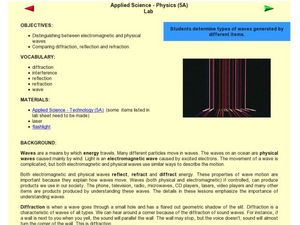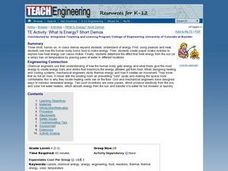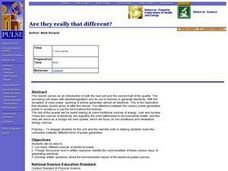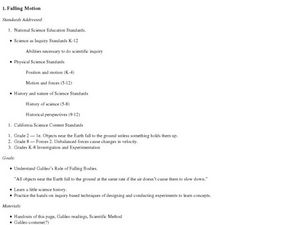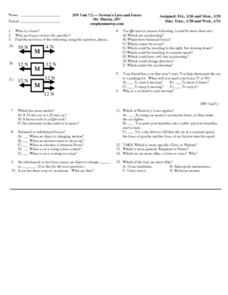Curated OER
A Classical & Relativistic Trip to a Black Hole
Students calculate distance, velocity, acceleration and time on their fantasy trip to the black hold. They apply Newton's Laws of Motion and calculate circular motion. They discuss any questions that may arise.
Curated OER
Unraveling the Mysteries of Objects in Space
Learners study emitted and absorbed light, and label each type of spectrum. They identify elements by their spectral signatures and use a spectroscope.
Curated OER
The Physics of Hummingbirds: Magic in the Air
Students study hummingbirds and how they use Newton's law. In this motion lesson students complete several activities and view videos of hummingbirds.
Curated OER
Reflection, Refraction & Lenses
Learners are able to describe what happens to light when it strikes different materials. They describe the law of reflection. Students are able to explain why a mirror froms a virtual image. They are able to describe diffuse reflection.
Curated OER
Demonstrating Moon Phases
Third graders participate in a demonstration of the moon's phases. In this moon phase lesson, 3rd graders watch as the teacher demonstrates moon phases with a bright light and a Styrofoam ball. They answer questions associated with the...
Curated OER
Electromagnetic and Physical Waves
Students compare and contrast electromagnetic and physical waves. In this wave lesson, students discover that all waves reflect, refract, and diffract energy. Students work in small groups to experiment with waves and evaluate the type...
Curated OER
Forces in Action
Second graders experiment to understand how force is effected by friction. In this forces in action lesson, 2nd graders view a website to simulate what happens when the height of a ramp is changed. Students participate in an...
Curated OER
Using Models to Communicate
In this models worksheet, students read about how models are used to communicate events or principles in science. They are given an example and answer 4 questions about models. They discuss accuracy and inaccuracy of models. They create...
Curated OER
What Is Energy? Short Demos
Learners engage in three short, hands-on, in-class demos which expand students' understand of energy. First, using peanuts and heat, learners see how the human body burns food to make energy. Then, they create paper snake mobiles to...
Curated OER
F = a, Inertia, and Friction
Fourth graders use a matchbox car to push across a hard surface and observe what happens. They then push the car across a soft or rough surface and discover what happens. The two ideas are discusses as Newton's First and Second Laws of...
Curated OER
The Physics of Toys
Students explore physics by experimenting with classic toys. In this physical science lesson, students utilize gliders, energy balls, bouncing balls, marbles and other toys to explore how they work. Students explore each toy at a work...
Pennsylvania Department of Education
Energy in Motion
Fifth graders explore energy transfer. In this thermal energy lesson plan, 5th graders stretch rubber bands several times and estimate the band's temperature change. Students identify this action as an example of thermal energy. Students...
Curated OER
Harmonic Motion
In this waves worksheet, high schoolers review the characteristics of harmonic waves including amplitude, cycle, phases, and friction. This worksheet has 37 problems to solve.
Curated OER
Plants in Motion
In this plants worksheet, learners watch movies about plant growth and then answer multiple choice and short answer questions about them. Students answer 6 questions total.
Curated OER
Science: Generating Electricity
Eighth graders examine the various methods of generating electricity and explain their commonalities. They determine what is the most common source of energy and what are the potential environmental health hazards due to electrical...
Curated OER
Falling Motion
Students design and conduct an experiment on Galileo's Rule of Falling Bodies. In this physics lesson, students collect and analyze data. They create a presentation and share it with the class.
Virginia Department of Education
States and Forms of Energy
Energy is just energy, right? Explain various forms of energy to your young scientists by using an interactive experiment that contains common objects to demonstrate complex concepts. Pupils conduct experiments for radiant, thermal,...
Curated OER
Hello, Sunshine!
Students investigate how the sun travels across the sky at different latitudes using Solar Motion Demonstrator. In this earth science lesson, students explain why seasons change. They study how the tilt of the Earth's axis affects...
Virginia Department of Education
Predicting Products and Writing Equations
A chemistry lesson plan presents 14 chemical reactions for scholars to observe, write the equation, and balance the equations. Additionally, it provides ways to extend the activity as it relates to catalysts.
Curated OER
Traveling Bowls
Students investigate the relationship between force and motion while conducting an experiment to answer the question,"How do objects move?". In small groups, they predict how many washers are needed to pull a bowl across a finish line.
Curated OER
Wave Action
In this wave worksheet, students compare the different ways a wave can react: absorption, reflection, refraction, and diffraction. Students also read about constructive and destructive interference. This worksheet has 13 matching, 10...
Curated OER
Me And My Shadow
Students investigate the concept of a shadow. They design a tool to create shadows for an experiment. They make observations and record the size and shape of shadows. The lesson contains background information for the teacher to deliver...
Curated OER
Model Rockets
Students build a model rocket. In this model rocket lesson, students explore a rocket launch cycle. Students investigate the laws of physics for each part of the launch. Students build model rockets and launch at school.
Curated OER
Newton's Laws and Forces
In this Newton's laws and forces worksheet, high schoolers answer 11 questions about inertia, vectors, force, and acceleration using Newton's laws. They also answer 3 questions about classification of species.







